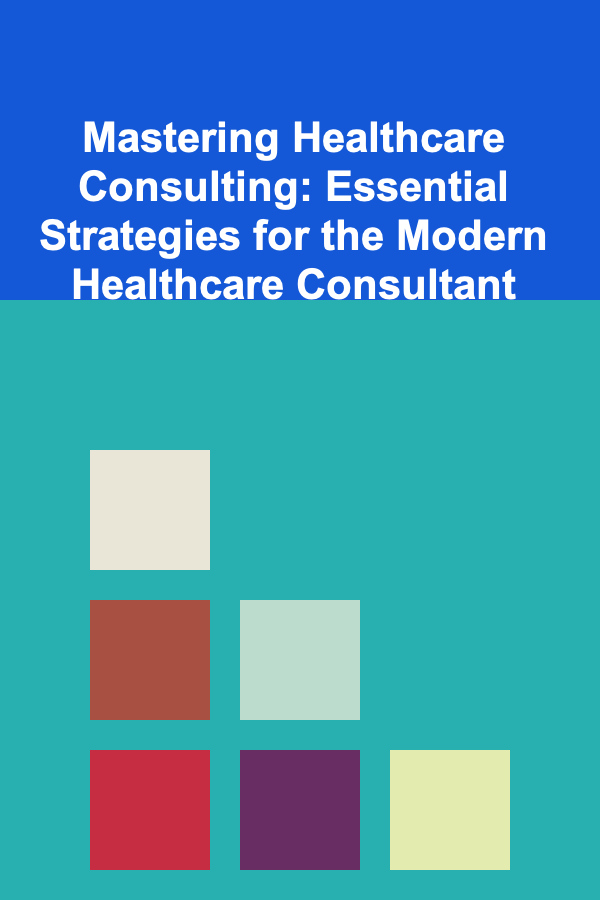
Mastering Healthcare Consulting: Essential Strategies for the Modern Healthcare Consultant
ebook include PDF & Audio bundle (Micro Guide)
$12.99$11.99
Limited Time Offer! Order within the next:

Healthcare consulting is one of the most dynamic and rewarding fields within the broader consulting industry. As healthcare systems become more complex, organizations seek professionals who can navigate the intricacies of the healthcare landscape, improve operational efficiency, and drive innovation. For healthcare consultants, it's crucial to stay ahead of industry trends, master effective strategies, and build a robust skill set to succeed in this fast-paced and often high-pressure environment.
This guide aims to provide actionable strategies for modern healthcare consultants, whether you're a newcomer to the industry or a seasoned professional looking to refine your approach.
Understanding the Healthcare Ecosystem
Before diving into the strategies, it's important to understand the broad ecosystem that healthcare consultants work within. Healthcare systems are multifaceted and include:
- Hospitals and Healthcare Providers: These entities are at the core of healthcare delivery, including physicians, nurses, administrators, and support staff.
- Health Insurance Companies: Insurance firms play a pivotal role in financing healthcare services and determining reimbursement levels.
- Government Programs: Public policies such as Medicare and Medicaid in the U.S. shape much of the healthcare industry.
- Regulatory Agencies: Bodies such as the FDA (Food and Drug Administration) and CDC (Centers for Disease Control and Prevention) regulate healthcare practices and standards.
- Technology Providers: The adoption of health tech tools like Electronic Health Records (EHR), telemedicine, and AI-driven healthcare innovations are reshaping the sector.
As a healthcare consultant, you must understand the interactions between these various components and identify where inefficiencies, gaps, or opportunities exist. The following strategies will help you thrive in this complex ecosystem.
Mastering Healthcare Regulations and Compliance
The healthcare industry is heavily regulated, and consultants must be well-versed in the various compliance standards and regulations that govern the sector. From HIPAA (Health Insurance Portability and Accountability Act) to FDA approvals and Medicare rules, understanding these regulations is crucial for providing effective consulting services.
Actionable Strategy:
- Stay Updated: Healthcare regulations are frequently updated, so you should regularly review government websites, join healthcare industry forums, and participate in webinars to stay on top of changes.
- Develop Specialized Knowledge: Consider focusing on specific regulatory frameworks, such as HIPAA compliance for healthcare data privacy or the Affordable Care Act for insurance policies. Specialization allows you to provide more targeted and in-depth advice to your clients.
- Leverage Regulatory Technology: Many software solutions now exist to streamline compliance processes. Familiarize yourself with tools that can help healthcare organizations manage regulatory risk and keep their practices compliant.
Leveraging Data Analytics to Drive Decision-Making
Data analytics has become a cornerstone of modern healthcare, offering vast potential to optimize everything from patient care to operational efficiency. Healthcare consultants should be proficient in interpreting and leveraging healthcare data to drive decisions.
Actionable Strategy:
- Implement Predictive Analytics: Use data-driven models to predict patient outcomes, demand for healthcare services, or operational inefficiencies. Predictive analytics can help healthcare providers anticipate trends, optimize staffing, and improve patient care.
- Utilize EHR Data: Electronic Health Records are a goldmine of patient data. You should be proficient in extracting meaningful insights from EHR systems to improve patient care quality, reduce readmission rates, and minimize errors.
- Enhance Operational Efficiency: By analyzing hospital operational data (e.g., patient flow, bed utilization, supply chain management), consultants can recommend improvements that can reduce costs, increase throughput, and enhance patient satisfaction.
Understanding Financial Management in Healthcare
Healthcare is an industry with massive costs, and effective financial management is critical for the sustainability of any healthcare organization. As a healthcare consultant, understanding cost structures, reimbursement models, and financial planning in healthcare is essential.
Actionable Strategy:
- Optimize Reimbursement Models: Many healthcare providers struggle with reimbursement issues, especially as insurance policies and government programs evolve. You should assist clients in navigating reimbursement complexities by identifying the most cost-effective reimbursement models, ensuring proper billing practices, and reducing claim denials.
- Cost-Reduction Strategies: Help clients reduce unnecessary costs by analyzing their expenses, suggesting operational improvements, and benchmarking against industry standards. For example, consultants can recommend strategies for reducing hospital readmission rates or improving the supply chain for medical equipment.
- Value-Based Care: Transitioning from fee-for-service to value-based care models is a growing trend in healthcare. As a consultant, helping clients move to value-based care models, which focus on patient outcomes rather than volume of services, will help organizations achieve sustainable financial health.
Focus on Technology Integration
The healthcare industry is undergoing a technological transformation, and consultants who can guide organizations through this change will stand out. From telemedicine to AI-driven diagnostics and automation, understanding the latest technological trends and their implementation is vital.
Actionable Strategy:
- Assess Technology Needs: Start by performing a comprehensive needs assessment to understand where technology can add the most value. Whether it's improving patient access to care through telemedicine, enhancing diagnosis accuracy with AI, or streamlining administrative tasks through automation, identifying the right solutions for clients is key.
- Guide System Integration: Healthcare organizations often use a combination of legacy systems and new technology. As a consultant, you'll need to help clients integrate new technologies, such as EHRs, into their existing systems to ensure seamless operation and interoperability.
- Implement Health IT Solutions: Help clients select and implement Health Information Technology (Health IT) solutions that improve efficiency, patient care, and regulatory compliance. Be well-versed in solutions like EHR systems, patient portals, and health information exchange platforms.
Fostering Collaboration and Change Management
Healthcare organizations are complex, with multiple stakeholders involved in any change initiative. As a consultant, effective collaboration and change management skills are essential for the success of any project.
Actionable Strategy:
- Stakeholder Engagement: Identify and engage all key stakeholders (doctors, nurses, administrators, insurers, and patients) early in the process to understand their concerns and gain buy-in for proposed changes. Effective communication is crucial to addressing concerns and ensuring that all parties are aligned with the change process.
- Develop a Change Management Plan: Healthcare organizations may be resistant to change due to the complexity of their operations. Develop a clear, step-by-step change management plan to guide the organization through transitions. This plan should include training, timelines, and milestones to ensure the successful adoption of new practices or technologies.
- Lead by Example: As a consultant, you must model the behaviors you want to see in your clients. Show flexibility, maintain a positive attitude, and be transparent about the challenges and opportunities that change can bring.
Building and Maintaining Strong Client Relationships
One of the most critical aspects of healthcare consulting is the ability to build strong, trust-based relationships with clients. Healthcare organizations often require long-term guidance, and consultants who can foster ongoing relationships will benefit from repeat business and referrals.
Actionable Strategy:
- Provide Value Beyond the Contract: Demonstrate your value by offering insights, tools, and strategies that improve the client's operations even outside of your immediate consulting scope. Helping clients optimize processes, save costs, or improve patient satisfaction will cement your reputation as a trusted advisor.
- Communicate Effectively: Ensure regular and open communication with your clients, providing status updates, addressing concerns promptly, and adapting your approach as needed. Transparency is key to maintaining trust.
- Build a Network of Experts: Healthcare is a multidisciplinary field. Build a strong network of experts (e.g., doctors, financial analysts, IT specialists) who you can collaborate with to offer clients a more comprehensive service.
Continuously Developing Industry Expertise
The healthcare industry is constantly evolving. To remain relevant, healthcare consultants must commit to lifelong learning and continuously develop their expertise.
Actionable Strategy:
- Stay Informed on Industry Trends: Regularly read industry publications, attend conferences, and join professional associations to keep up with the latest healthcare innovations, regulatory changes, and best practices.
- Pursue Advanced Certifications: Earning certifications in healthcare management, data analytics, or specific healthcare technologies can enhance your credibility and expand your skill set.
- Leverage Peer Learning: Network with other healthcare consultants to share experiences, strategies, and insights. Peer learning can accelerate your professional development and offer fresh perspectives on challenges in the field.
Conclusion
Mastering healthcare consulting requires a multifaceted approach that combines technical knowledge, strategic thinking, and strong interpersonal skills. By understanding the complexities of healthcare systems, staying updated on regulations, embracing technology, and fostering collaboration, healthcare consultants can create meaningful impact for their clients.
The key to success in healthcare consulting is continuous learning and adaptation. With the right strategies, consultants can navigate the challenges of the industry and drive positive change that benefits both healthcare organizations and the patients they serve.

Automate Your Passive Income Stream Using Deep Learning Techniques
Read More
How to Choose the Right Pet for Your Lifestyle
Read More
How to Create a Functional Entryway with Storage Solutions
Read More
How to Design a Space-Saving Entryway with Practical Ideas
Read More
How to Make Money Online as an Industrial Designer? 10 Actionable Ideas
Read More
Making Money from Deep Learning through Affiliate Marketing
Read MoreOther Products

Automate Your Passive Income Stream Using Deep Learning Techniques
Read More
How to Choose the Right Pet for Your Lifestyle
Read More
How to Create a Functional Entryway with Storage Solutions
Read More
How to Design a Space-Saving Entryway with Practical Ideas
Read More
How to Make Money Online as an Industrial Designer? 10 Actionable Ideas
Read More